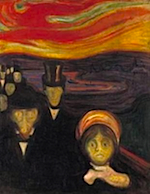By CHRISTIAN WIMAN [The American Scholar] – There is a distinction to be made between the anxiety of daily existence, which we talk about endlessly, and the anxiety of existence, which we rarely mention at all. The former fritters us into dithering, distracted creatures. The latter attests to—and, if attended to, discloses—our souls. And yet it is a distinction without a difference, perhaps, and as crucial to eventually overcome as it is to initially understand, for to be truly alive means to feel one’s ultimate existence within one’s daily existence, to feel one’s trivial, frittering anxieties acquiring a lightness, a rightness, a meaning. So long as anxiety is merely something to be alleviated, it is not life, or we are not alive enough to experience it as such.
I don’t mean to be describing an intellectual transformation, or a transformation that is available only to “intellectuals.” I suppose that for many people—people inclined to read essays like this one, for instance—the transformation might seem to begin with a mental decision and a definite application of the will. In fact, I think taking such a step indicates that some rift of meaning and feeling has already opened inside of us, and we are clutching, consciously or unconsciously, at the rock face and rubble above this sudden abyss. In the end if we are to integrate our anxieties into our lives—and thereby alleviate them—any merely intellectual understanding of them is inadequate.
Consciousness among contemporary Western intellectuals is an “apprehensive” quality: that is to say, we become conscious by taking hold of, or apprehending, our selves and reality, by standing apart from them. Not at all coincidentally, we grow apprehensive as we do so (for where, exactly, are we standing?).
Continued at The American Scholar | More Chronicle & Notices.






















Post a Comment